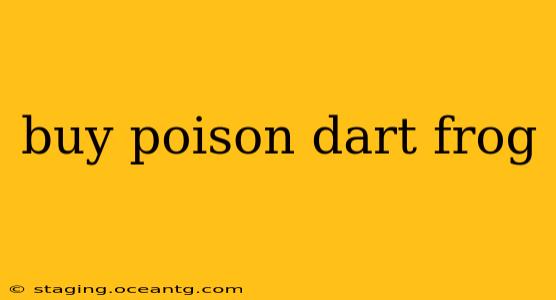The vibrant colors and fascinating behaviors of poison dart frogs make them incredibly appealing pets. However, bringing one of these unique amphibians into your home requires significant research and commitment. This guide explores everything you need to know before buying a poison dart frog, ensuring you can provide the best possible care and contribute to their conservation.
What types of poison dart frogs can I buy?
Many species of poison dart frogs are available in the pet trade, each with unique care requirements. Popular choices include the Green and Black Dart Frog (Dendrobates auratus), the Blue Dart Frog (Dendrobates tinctorius "azureus") and the Strawberry Poison Dart Frog (Oophaga pumilio). Before choosing a species, research its specific needs, including terrarium size, humidity, and temperature preferences. Different species exhibit different behaviors and color variations, too, so choose one that appeals to you aesthetically and suits your experience level. Remember that some species are more challenging to care for than others.
Where can I buy poison dart frogs legally and ethically?
Finding a reputable breeder is crucial. Avoid purchasing frogs from unreliable sources like online auctions or pet stores that don't specialize in amphibians. Look for breeders who prioritize the health and well-being of their animals. Responsible breeders will be knowledgeable about the species they breed and will be happy to answer your questions about their husbandry practices. They should also be able to provide documentation showing the origin of their frogs. This helps ensure you aren't contributing to the illegal wildlife trade. Checking with local herpetological societies can help you locate reputable breeders in your area.
How much does a poison dart frog cost?
The price of a poison dart frog varies depending on the species, age, and the breeder's reputation. Generally, you can expect to pay anywhere from $30 to $100 or more per frog. Remember that the initial cost of the frog is only a small part of the overall expense. You'll also need to invest in a suitable terrarium, lighting, heating, substrate, and other equipment. Factor in the ongoing costs of food, supplements, and potential veterinary care.
Are poison dart frogs poisonous to humans?
While the name suggests otherwise, captive-bred poison dart frogs are generally not poisonous to humans. They lose their toxicity when their diet changes from wild insects containing poisonous alkaloids to the crickets and fruit flies provided in captivity. However, it's still essential to practice good hygiene and wash your hands thoroughly after handling them or their terrarium to avoid any potential skin irritation.
What do poison dart frogs eat?
Poison dart frogs primarily eat insects, such as fruit flies, springtails, and pinhead crickets. A varied diet is crucial for their health and well-being. Providing supplements like calcium and vitamin D3 is also important to prevent nutritional deficiencies. Be diligent about purchasing high-quality insect food and avoiding contaminated feed.
What size terrarium do I need for poison dart frogs?
The size of the terrarium will depend on the number and species of frogs you are keeping. However, a good rule of thumb is to provide ample space for them to thrive. Research the specific space requirements for your chosen species. A larger terrarium is generally better than a smaller one, as it provides more space for exploration and reduces stress. Vertical space is important for arboreal species.
What kind of substrate should I use?
The substrate plays a vital role in maintaining the appropriate humidity and drainage within the terrarium. Common substrates include coconut fiber, sphagnum moss, and leaf litter. The specific substrate will depend on the species of frog and the overall environment you aim to create. Maintaining the correct humidity is critical for the health of your frogs.
Buying a poison dart frog is a rewarding experience for knowledgeable and dedicated keepers. Remember that responsible ownership involves extensive research, careful planning, and a long-term commitment to providing the best possible care for these fascinating creatures. By choosing a reputable breeder and understanding their needs, you can contribute to their continued well-being and avoid contributing to the negative impacts of the illegal wildlife trade.
